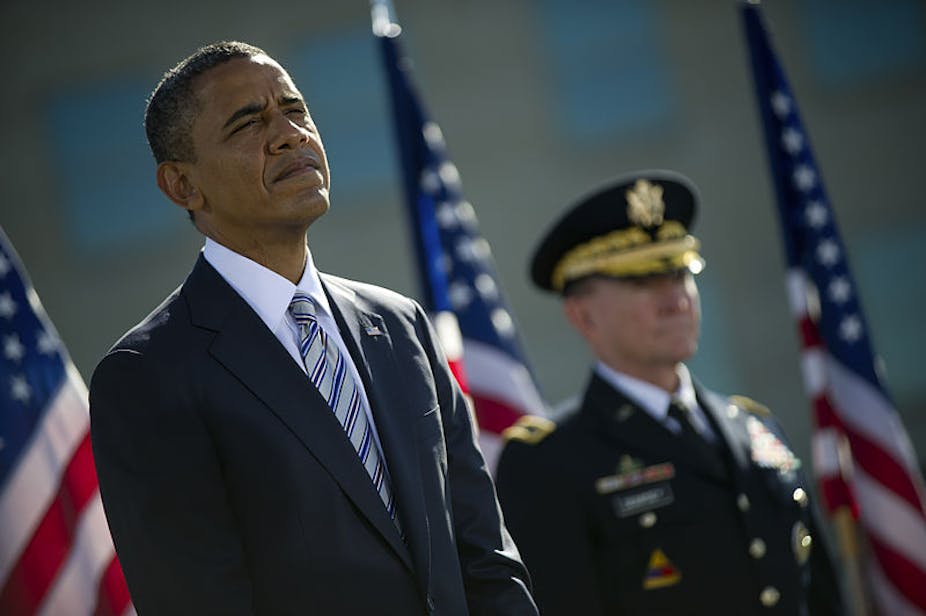America prefers its wars short, sharp and decisive – unfortunately, what some are already calling the third Iraq war is likely to be long, murky, and indecisive.
With his September 2014 announcement of a strategy against Islamic State (IS), President Obama tried to prepare the American public, cautiously forecasting an engagement of three years. Unfortunately, few listened – and even fewer believed him. Many, including his own former defence secretary Leon Panetta, expect this war to last for decades.
Pundits and political opponents are now making a fine living out of criticising the Obama administration’s security policy. That much is easy enough today, in the very early stages of what will probably be only the initial campaign of a series of unsatisfactory campaigns.
But once the uncomfortable realities of the situation in the Middle East are taken into account, the administration’s unloved strategy makes rather more sense.
Political battles
Whether in Kobanê now or one day even in Baghdad, the war against IS will not be won or lost with individual battles. No-one should work themselves into a frenzy because the extremists capture one town or another. Conversely, victories by Baghdad’s army or the defence of some forward position by coalition air power should not be interpreted as winning.
It is a truism that all wars are political, and indeed, we will only know who won or who lost when a de facto or de jure political settlement is reached – but even those are often highly unclear.
Meanwhile, much ink has been spilled over the sorry state of the so-called anti-IS coalition. Its 60 members are doing … what, exactly? How effectively are they doing it? Isn’t the US doing all the heavy lifting? Are objectives of the individual coalition members compatible with America’s? And on and on and on.
These worries miss the point. The US has enough combat power, when joined by the boots on the ground provided by the Peshmerga and the Iraqi government, to fight IS effectively – and it doesn’t really need the full operational and political support of coalition members to fight IS. Instead, it needs bases, permissions, intelligence support and behind the scenes co-ordination.
But most importantly, it urgently needs legitimacy, especially in the Arab world, but also in Europe.
Damage limitation
Aside from the obvious desire to risk as few American casualties as possible, the main reason for using air power is its sustainability. Although aircraft and airmen are very expensive, particularly when used at a high operational tempo, the US is rich in these resources; it can afford long air campaigns, especially when the odds of IS shooting down an American plane are relatively low.
As befits this relatively hands-off approach, the US’s objectives are so far modest – certainly compared to the neo-conservative fantasy of reshaping the entire Middle East via a short campaign to overthrow Saddam Hussein. The president spoke of “degrading and destroying” IS, but this was mostly a rhetorical necessity: he and his advisers know that the campaign against IS will be indefinite.
Yet the actual strategic objective is an altogether straightforward one: the US will succeed if it can help local forces prevent IS from consolidating its political and territorial power. The goal, put bluntly, is to keep the group in a box.
This is an age-old type of conflict. The Romans fought for centuries on the German frontiers; the British struggled for more than 150 years to consolidate power in India; the Chinese held off Mongol invaders for decades, even building the Great Wall at enormous cost to prevent raids into their heartland. It remains to be seen whether the US can sustain 30-plus years of conflict, not to reshape the greater Middle East but just to prevent the region’s worst nightmares from becoming reality.
Patience and prudence
What’s certain is that for the US to maintain its leadership of the global security system, its strategists and pundits have to get over the idea that there are simple and cheap solutions to complex security challenges.
With rare exceptions, wars generally are anything but short, sharp and decisive; more than ever, today’s conflicts are messy and indeterminate. Most of America’s adversaries don’t want to come out and fight in the open. That means years of dangerous, difficult anti-insurgency operations lie ahead.
To listen to American politicians, of course, one would have no idea. As the 2016 presidential campaign cycle begins to churn, politicians from both parties will try to convince the American and international publics that they have quick fixes up their sleeves. Those public must not allow themselves to be conned.
The Middle East will be in turmoil for decades to come. If the US wants to stop ever more radical regimes from consolidating power there, it must be prepared to engage for the long term – and that engagement will sometimes require the use of military force.
The best we can ask for from our leaders is prudence and patience: prudence so they do not commit to military intervention when unnecessary, and patience to stay the course when they have to. Only then can the US remain the indispensable nation many – at least American - political leaders think it should be.

